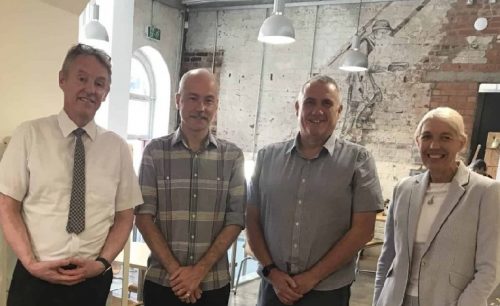Plans mooted for Jewellery Quarter incubator

The Jewellery Quarter Development Trust (JQDT) has commissioned research and an options appraisal for a potential Jewellery Quarter Incubator to support growth of the jewellery and other creative industries in the area.
The Jewellery Quarter has a 250 year old industrial cluster and there are estimated to be more than 600 firms and over 4,000 employees working in the jewellery, precious metals and related industries.
Skills development, business support and affordable workspaces are often cited as essential ingredients for the growth of all the Jewellery Quarter’s creative industries.
The survey is being funded by the Greater Birmingham and Solihull Local Enterprise Partnership (GBSLEP) and conducted by the Institute for Design, Economic Acceleration & Sustainability (IDEAS) at Birmingham City University, on behalf of the JQDT and the Jewellery Quarter Cultural Action Zone.
Speaking about the importance of the survey, Matthew Bott, Jewellery Quarter Development Trust board director and co-chair of the Jewellery Quarter Neighbourhood Plan, said: “Given the challenges facing the whole economy and specific local issues, this survey will establish what more can be done to support creative businesses right across the Jewellery Quarter. We want to find out how best an Incubator and Hub can be put in place to nurture and grow existing new companies.
“For entrepreneurs we see the opportunity for a range of business support services including access to physical and virtual space, coaching and skills development, common services provision, networking connections and promotion. It’s really important that people give us the benefit of their in-depth experience.”
Beverley Nielsen, Associate Professor at the Institute for Design, Economic Acceleration & Sustainability (IDEAS) at BCU added: “This survey will add to the information we collected in 2016. For some time, there’s been a concern about the jewellery industry cluster being in decline. Certain parts are thriving, new technologies are being harnessed with great results and some wonderful new talent is being established. However, there’s a recognition that hand, craft, and bench skills are diminishing arts as people retire . Some of these remain essential to the integrity of the jewellery industry cluster including polishing, plating, enamelling, stone setting, aspects of engraving, finishing, antiquing and even repairing.
“This survey aims to highlight the particular features of the Jewellery Quarter industry cluster and clarify some of its many interconnections. These businesses are buying and selling off each other regularly and become interdependent whilst also being, in some cases, competitors. We will look to establish key strengths and weaknesses, skills gaps, and look at how talent might be retained and developed with an additional focus on the practical skills required into the future.
“We will also be able to make comparisons with past performance here and luxury clusters elsewhere, as well as highlight some of the trends facing the industry. So far, we have spoken with almost 30 businesses and we’re really keen to reach as many as possible.”
Greg Fattorini, managing director of Jewellery Quarter’s Fattorini and Son’s, said: “The Jewellery Quarter industry cluster is world class. It is an invisible, complex, interdependent network of interconnected companies and creative individuals; the retail trade in the Jewellery Quarter being just the tip of the iceberg. It is a precious asset to Birmingham, the West Midlands and the nation that should be nurtured and promoted.”
The survey can be found online here and takes 15-20 minutes to complete.








